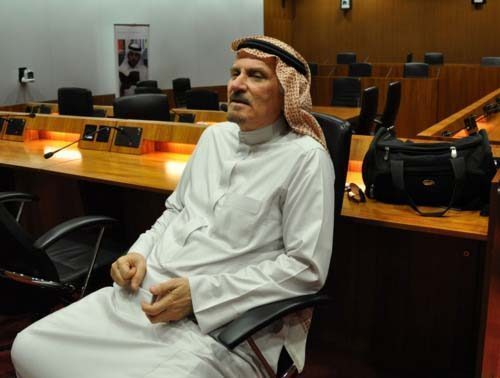
Khaled Almaeena is the editor-in-chief of Arab News, one of the largest and longest-running English-language newspapers in the Gulf.
The paper is often gutsy with its content, and that no doubt has a lot to do with Almaeena, a Saudi who has been educated in the United States, Britain and Pakistan (he’s fluent in Urdu!).
Almaeena spoke about Saudi Arabia’s past, present and future at CMU-Q on Sunday. Here’s a list of nine things I learned from his talk:
1) Saudi Arabia is “not just one country.”
“People think of Saudis as a uniform people, because we all wear white and the women wear black,” Almaeena said. But in reality, the country is united only on one day: “When the soccer (football) team plays someone else.”
Otherwise, the nation is composed of different tribes and people from different backgrounds, so getting them to rally under one umbrella and agree on anything besides sports will take time, he said.
2) The youth is eager for reform – but not revolution.
“Young Saudis don’t want to be bystanders – they want to play a role in the decision-making process,” Almaeena said. About 26 million people live in the Kingdom, 20 million of them Saudis. The median age is 25.
Demographics-wise, the young people are a force to be reckoned with. “Half of our population is under 40,” Almaeena said. “These people – they want action. But there people in the government who do not want the status quo to change.”
3) Saudi women are not as downtrodden as we think.
“Women in Saudi Arabia are not what you think as helpless creatures,” Almaneea said. Some have eschewed traditional jobs like teaching and entered fields like engineering.
“Not the percentage we would like, but it’s for them to choose what they want,” he said, adding that “women are women’s own enemies in Saudi Arabia.”
4) The main impediment to progress in Saudi Arabia is a lack of education.
Young people need to hone the ability to think and have the ability to choose, Almaeena said.
“We have to have a high standard of education” and the kingdom is working to build colleges and schools that preach tolerance and acceptance of others.
5) KSA suffers from a host of other problems
Those include non-participation of women, a lack of a “frank” media, “mind-boggling” bureaucracy and environmental issues like desertification.
About 70% of Almaeena’s staff at Arab News is comprised of women, including the managing editor.
Almaeena said he has a big poster in his room stating, “The best man for the job is a woman.” But he also admits “there are many many obstacles because of the male attitude in Saudi Arabia.”
6) The King does not have absolute power.
This is a myth, Almaeena said, adding that Crown Prince also does not control every single thing that goes on in the kingdom.
“We have a shura,” he said. The notion that these man can “get away with” things via written decree doesn’t hold any water.
“If you are a statesman you cannot play with fire,” he said. “King Abdullah is not a politician, he’s a statesmen.”
7) Saudi Arabia is the #2 aid donor in the world in terms of GDP.
The United States is #1, and the two countries switch back and forth.
“The perception that this country is only for the Muslims is wrong,” Almaeena said, adding that the kingdom has contributed to relief efforts in Japan, Haiti and Mexico.
8) Practical concerns could result in change.
The kingdom faces a lot of criticism from the rest of the world about how it treats its women and runs its country. But “change is coming from within,” Almaeena said.
The editor cited the increasing number of dual-income families in which a woman could not afford to hire a driver to take her to work. ”Economics will push things from the inside.”
9) Social media has already “changed the face of Saudi Arabia.”
When the floods hit Jeddah in January, young people used Facebook, Youtube and Twitter to coordinate aid efforts and share information.
These mechanisms are also helping to keep corruption in check. “If i do not publish something that has happened in my paper, in five minutes it’s on Youtube,” Almaeena said.
What do you guys think about what he said?







